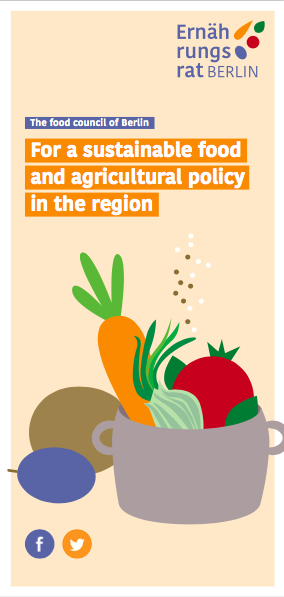The Berlin Food Policy Council
The Berlin Food Policy Council (Ernährungsrat Berlin) for a sustainable food and agricultural policy in the region represents a broad coalition of citizens. Its goal is the active promotion of a sustainable transformation of the food system in the region.
The Berlin Food Policy Council is the platform for all local and regional actors who are active in this transformation. From this platform the participating consumers, farming producers, urban gardeners, food rescuers, representatives of the local gastronomy and food economics, scientists, representatives of associations, clubs, and educational institutions and others develop their common goals and strategies and turn them into political activities and actions.
It is part of our self-understanding to give a voice to civil positions and demands for a sustainable food system and to invest them with political clout.
Why a food council?
There is no denying it any longer: The way food items are produced and consumed in this country is neither sustainable nor fair. We produce and consume in excess, throw away too much, and, as a matter of course, accept the global exploitation of people and nature in service of our wasteful ways of consumption.
Across the globe, we consume too many resources like soil, water, and fossil fuels. In doing so, we damage the environment, the climate, and our own health. Although this system is obviously not sustainable as it is, it is still being promoted through politics. In contrast, alternative approaches and ideas often have to overcome large structural obstacles.
More and more people from Berlin want to change that and transform the current food system into a sustainable one. By signing the “Milan Urban Food Policy Pact” in the fall of 2015, Berlin has committed itself to the creation of a sustainable and just food system.
The red-red-green coalition, which took control of Berlin’s government at the end of 2016, pledged in their coalition agreement to develop, in collaboration with the Berlin Food Policy Council, a sustainable, locally-minded food strategy for Berlin.
To remind the city of these pledges, to demand their implementation, and to stand up for the necessary prerequisites and maker spaces — all that is part of what the Food Policy Council Berlin (Ernährungsrat Berlin) stands for.
Implement the food system transformation!
Our vision for a just and sustainable food system for Berlin takes the political concept of food sovereignty as its starting point.
This implies a (re-)democratisation of agricultural and food production such that fundamental principles — like the human right to nourishment, the reinforcement of local markets, fair price formation, livelihood-securing income, and the communal preservation of natural resources— will be realised.
For our vision to become reality, we collectively develop a sustainable food strategy with concrete fields of action for urban food policy. We communicate with politicians and administrators on both senate and district level about scope of action, necessary framework conditions, as well as actions to be taken and organise public discussions and events.
Within our work groups, positions will be developed and custom projects will be worked out and implemented.
Together we execute actions and other campaign activities for a sustainable food system.
This is what we advocate:
(1) A primarily regional agriculture and processing that permanently maintains local jobs and creates sustainable development prospects for the producers.
(2) The entrenchment of environmental protection and conservation throughout the value chain — from production through transport, processing, trading and consumption to recycling and disposal.
(3) A food system that is marked by diversity across every dimension: with respect to biodiversity just as much as economic actors, marketing channels and routes to market, possibilities of consumption, product ranges, and lifestyles.
(4) Fair market structures that guarantee fair prices for producers and living wages for employees as well as healthy and ecologically produced food that is affordable for everyone.
(5) An alternative kind of urban and regional planning that provides physical and participatory spaces for the urban food system and grants precedence to local infrastructure over global trade and processing structures.
(6) Primary and advanced vocational training systems that impart knowledge of sustainability and justice in the food system as well as familiarity and practical competencies relating to the production, processing, and preparation of food items.
(7) A just food system that makes sustainable, health-promoting and culturally adapted food accessible to everyone without exploitation of humans here or elsewhere or the destruction of livelihoods.
(8) Democratic decision-making opportunities for residents of the region regarding their food system and those natural resources that are maintained as public property.
Participate!
Everyone who wants to actively shape and accelerate the sustainable transformation of the food system in our region is invited to join us!
For information about events, working groups, and possibilities for personal engagement, please see: http://ernaehrungsrat-berlin.de/mitmachen/ (in German).
The working language in most of our meetings is German so far, but don’t hesitate to contact us if you speak a different language – we will find a solution!
Our activities
We translate civil society positions and demands for a sustainable food system into political demands and communicate these to Berlin and Brandenburg state politicians. And we organise events and activities that advance the sustainable food transition. Most of our events are in German only – you can find an overview in the „Aktivitäten“ menu at the top.
For some of our activities, we have English versions or information in English:
More Information
Listen to co-founder Christine Pohl speaking about the Berlin Food Policy Council:




